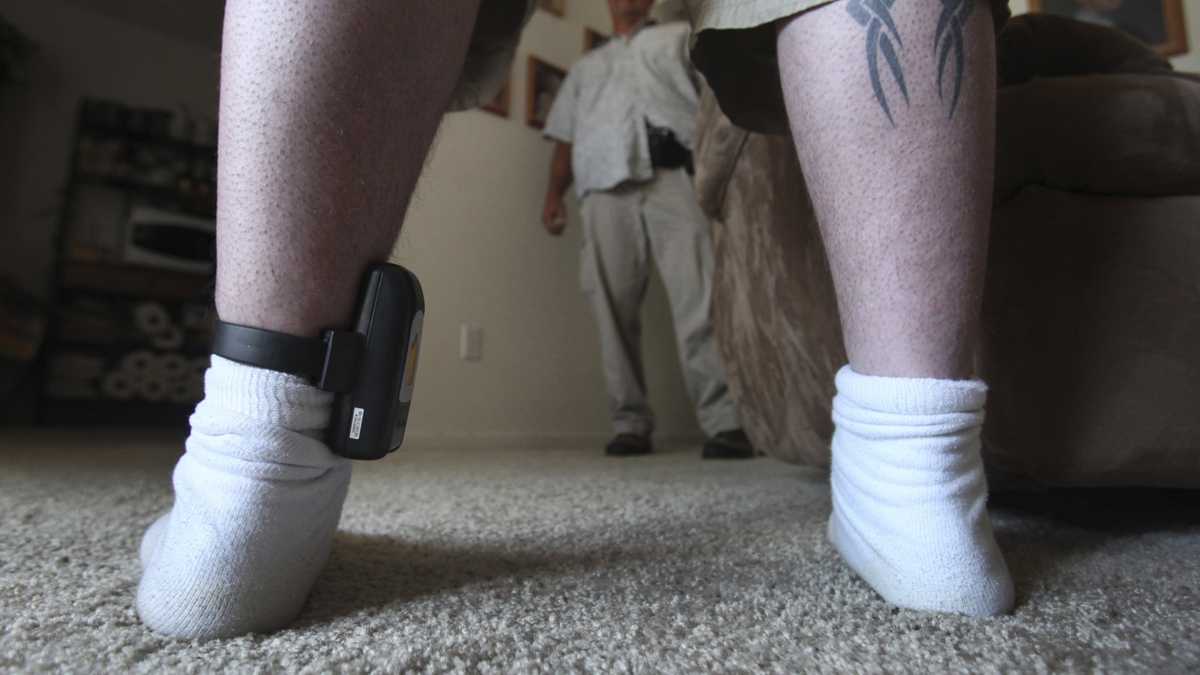Delaware state senator seeks to repeal cash bail changes
A Delaware senator wants to repeal legislation passed in early 2018 that aimed to address disparities in the state’s cash bail system.

A person wearing an ankle monitor. (Rich Pedroncelli/AP Photo, file)
A Delaware senator wants to repeal legislation passed in early 2018 that aimed to address disparities in the state’s cash bail system.
State Sen. Colin Bonini, R-Dover, said as a result of the bill, violent offenders who should be detained are being released before going on trial and are committing additional crimes.
“The way it’s being interpreted is release at any cost — and prior to that, we at least had a fair chance to set bonds appropriately for those folks we had concerns about,” he said.
“We have to focus more on the victims and less on the offenders, and I think we’ve gotten a little too far away from that.”
The reform bill directed judges to consider alternatives to cash bail, such as travel restrictions, check-ins with court officers or ankle bracelets.
When determining whether to use cash bail or an alternative, judges are encouraged to use a risk assessment tool that estimates a defendant’s likelihood of skipping a court hearing, or committing another crime.
The new rules were meant to address a disparity in the cash bail system causing non-violent offenders to be detained pretrial simply because they can’t afford bail. Criminal justice reform advocates say unnecessary detainment could cost a defendant their job, or pressure them to plead guilty.
Meanwhile, violent offenders with financial means could make bail and potentially reoffend, they argue.
“We do better for victims when the criminal justice system works, we do better for victims when we have more resources to provide support, and we can have those kinds of resources by avoiding throwing people in jail before trial who are not a risk to reoffend and are not at risk to flee,” said state Sen. Bryan Townsend, D-Newark, one of the original reform bill’s sponsors.
After the bill passed, however, some offenders released without bail did commit additional crimes.
The General Assembly passed a resolution sponsored by Townsend that urged the judiciary to work with stakeholders to ensure the new rules were understood and applied properly.
Early data shows while the number of pre-trial detainees has dropped 7%, the failure to appear and new crimes committed rates have remained fairly stagnant, said Sean O’Sullivan, a spokesman for Delaware Courts.
New criminal activity has dropped from 22% to 21%, while failure to appear has increased by just 1%.
Still, Bonini, and some of his Republican colleagues say they don’t believe the resolution worked, and have drafted legislation to repeal the bill.
“We have stacks of incidents where folks have done things that should have required bail or should have been remanded,” he said.
The heads of the Delaware Police Chief’s Council and the Delaware Fraternal Order of Police also support Bonini’s repeal proposal.
Middletown Police Chief Robert Kracyla spoke in support of Bonini’s plan during a Dover press conference on Tuesday. He recalled a time when his officers arrested a domestic violence suspect twice in one night.
“We knew that offender very well, we knew he’d be a repeat offender, we presented that to the court,” he said. “Six hours later we’re responding to the exact same residence, same thing, domestic violence, we arrest that suspect, and the same judge who heard it six hours earlier is hearing the same thing and that particular subject gets released again.”
Townsend argued the incidents Bonini and his supporters point to occurred within several weeks of the legislation being signed into law. He said since his resolution, improvements have been made.
“We have to be careful of looking at one or two examples and acting like that means the whole system is broken,” he said.
“If there are ways of improving, let’s improve it, but it’s a different matter entirely for Sen. Bonini to announce legislation that would gut a data driven approach to criminal justice that has proven to keep the community safer at a lower cost.”
Delaware Courts spokesman Sean O’Sullivan said judges have the flexibility to set a high cash bail for a “signal crime” — including violent crimes, sex crimes, gun crimes, and domestic violence crimes.
He said the Courts were able to resolve initial issues that arose by meeting with representatives from the criminal justice system, law enforcement and corrections.
“Changes were proposed to address issues related to domestic violence concerns and to identify additional crimes that should trigger heightened bail standards, including the Chief Justice’s suggestion of potential revisions to the pretrial assessment matrix used by the court in making bail decisions,” O’Sullivan said.
Over the next few weeks, data will be reviewed to determine any necessary changes, and make final recommendations for the Supreme Court’s consideration.
“We remain committed to working with all stakeholders as we implement this important reform,” O’Sullivan said. “We should not lose sight of the fact that this reform represents an important opportunity to improve the quality of justice in our state.”
Brendan O’Neill, Chief Defender at Delaware’s Office of Defense Services, said a repeal would be a step backwards, and “will punish those who have the least.”
“Freedom should not be based on a person’s ability to pay,” he said in an email statement.
A spokesman for Attorney General Kathy Jennings echoed those thoughts and said it’s part of the discussion to make improvements: “A pretrial detention system based on danger and risk of flight is far better than our current cash bail construct which penalizes the poor and rewards the rich … repealing SB 204 at the behest of a bail bond industry group would be an unfortunate step backwards.”
The Delaware General Assembly is currently in recess until early January.
WHYY is your source for fact-based, in-depth journalism and information. As a nonprofit organization, we rely on financial support from readers like you. Please give today.





